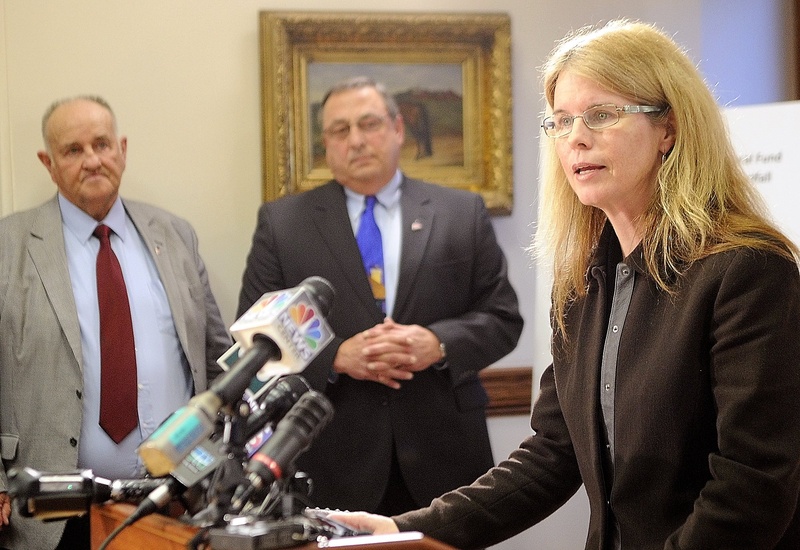The LePage administration has raised the stakes in a confrontation with the federal government over budget cuts that would eliminate health care coverage for about 27,000 low-income Mainers.
On Wednesday, the state asked the U.S. Department of Health and Human Services to approve changes to Maine’s Medicaid plan that would save $19.93 million and balance the budget.
But officials with the Centers for Medicare and Medicaid Services, the federal agency whose approval is needed, suggested that the state’s request is “inconsistent” with the law.
Accounting for some overlap, the changes would end benefits for an estimated 24,000 parents, 6,848 19- and 20-year olds and 1,825 Medicare recipients who also receive limited benefits under Medicaid, which operates in Maine as MaineCare.
Although the cuts appear to require a waiver of Medicaid standards that the DHHS has never granted to any state, the LePage administration contends that such waivers are no longer necessary, because of the U.S. Supreme Court’s decision in June on the Affordable Care Act.
Others contest that interpretation of the court ruling and maintain that it doesn’t affect the type of waiver that would apply to Maine’s request.
The dispute over the waiver requirement could lead to another lawsuit. If the state loses, it could be forced to reimburse the DHHS for the $19.93 million in expected savings, which Maine drew on to balance its budget this year.
Although the DHHS has 90 days to act on the state’s request, Maine has asked for a ruling by Sept. 1.
Mary Mayhew, commissioner of the state DHHS, said Wednesday the state has made a strong argument for the federal government to act quickly.
In Gov. Paul LePage’s cover letter to U.S. DHHS Secretary Kathleen Sebelius, the governor stressed that the cuts are necessary to preserve the state constitutional mandate for a balanced budget.
Brian Cook, spokesman for the Centers for Medicare and Medicaid Services, said the state certified that it has a budget deficit and, as a result, the agency will work with Maine officials as they seek to end Medicaid coverage for adults with income above 133 percent of the poverty line, as allowed by the law.
Disabled or pregnant adults in that income bracket would still be covered by Medicaid.
“Maine’s new request, however, would also end coverage for others who are now enrolled in the program,” Cook said in a written statement. “Maine appears to acknowledge that this request is inconsistent with the terms of the applicable federal statute, but we will fully review its submission.”
If Sebelius rejects the plan, LePage could try to claim that the federal government is hampering the state’s ability to balance its budget, an argument that is consistent with the national Republican-led opposition to the health care law.
Sebelius has not made any declarations about the waiver provision.
The situation in Maine is unique.
Many states with Republican governors — and a few with Democratic ones — have spurned future Medicaid expansions that are now encouraged, and more than 90 percent funded, by the health care law.
Maine appears to be one of the only states to book budget savings based on a reduction of Medicaid expansions that already have been made.
Democrats point to a recent opinion from the Congressional Research Service, which works as a think tank for Congress, saying the U.S. Supreme Court decision did not change the waiver requirement.
However, Thomas Barker, a former general counsel in the federal DHHS and the Center for Medicare and Medicaid Services, takes the opposite position.
“I do think they (the LePage administration) have a strong argument, but I don’t believe that HHS is going to back down,” said Barker. “The state may end up having to sue HHS.”
Maine is not the only state that’s considering such cuts, but he said he believes Maine has pushed the issue the furthest.
Maine Attorney General William Schneider argued Wednesday that because Maine voluntarily expanded its Medicaid program before the health care law took effect, the law’s waiver provision doesn’t apply.
The waiver, he said, violates “constitutional principles by imposing a post-acceptance, retroactive condition that gives Maine no choice and turns a voluntary program into a mandatory one.”
Schneider and Mayhew, the state DHHS commissioner, downplayed the prospect of a state-initiated lawsuit if the federal government doesn’t ratify the Medicaid plan. But the attorney general acknowledged that a lawsuit is an option.
The state could also be the subject of a lawsuit if it moves forward with the cuts without the waiver.
Ana Hicks, a senior policy analyst with Maine Equal Justice Partners, an advocacy group for low-income Mainers, has said that her organization will consider suing the state if the cuts move forward without a federal waiver.
On Wednesday, Hicks rejected the administration’s argument that the Medicaid cuts are “modest” changes that keep the eligibility standards in Maine above the national average.
“I would argue that eliminating Medicaid coverage for 27,000 low-income Mainers who have no other way of receiving health care is anything but a modest change,” Hicks said.
Staff Writer Steve Mistler can be contacted at 791-6345 or at:
smistler@pressherald.com
On Twitter: stevemistler
Washington Bureau Chief Kevin Miller can be contacted at 317-6256 or at:
kmiller@mainetoday.com
On Twitter: @KevinMillerDC
Copy the Story LinkSend questions/comments to the editors.




Success. Please wait for the page to reload. If the page does not reload within 5 seconds, please refresh the page.
Enter your email and password to access comments.
Hi, to comment on stories you must . This profile is in addition to your subscription and website login.
Already have a commenting profile? .
Invalid username/password.
Please check your email to confirm and complete your registration.
Only subscribers are eligible to post comments. Please subscribe or login first for digital access. Here’s why.
Use the form below to reset your password. When you've submitted your account email, we will send an email with a reset code.